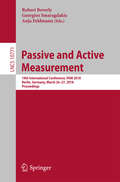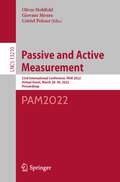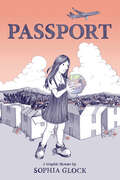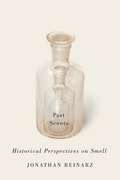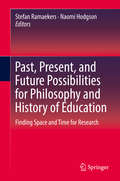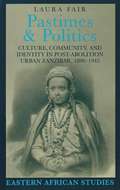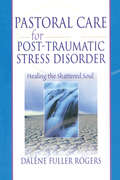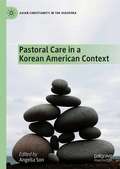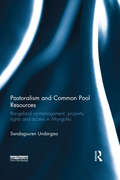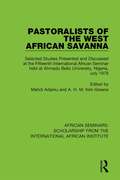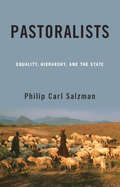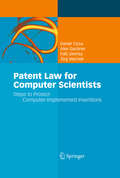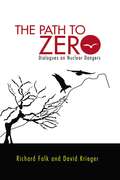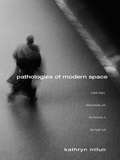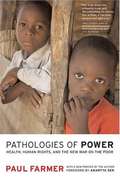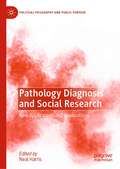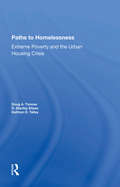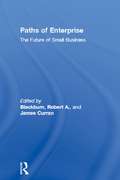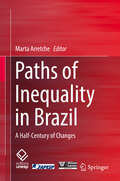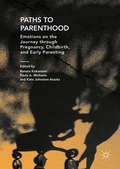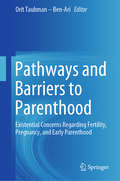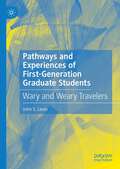- Table View
- List View
Passive and Active Measurement: 19th International Conference, Pam 2018, Berlin, Germany, March 26-27, 2018, Proceedings (Lecture Notes in Computer Science #10771)
by Robert Beverly Georgios Smaragdakis Anja FeldmannThis book constitutes the proceedings of the 19th International Conference on Passive and Active Measurement, PAM 2018, held in Berlin, Germany, in March 2018.The 20 full papers presented in this volume were carefully reviewed and selected from 50 submissions. The papers demonstrate the import and extent to which measurements pervade systems – from protocols to performance to security. They are organized in the following topical sections: models and inference; security and privacy; CDNs; DNS; certificates; interdomain routing; and analyzing protocols.
Passive and Active Measurement: 23rd International Conference, PAM 2022, Virtual Event, March 28–30, 2022, Proceedings (Lecture Notes in Computer Science #13210)
by Oliver Hohlfeld Giovane Moura Cristel PelsserThis book constitutes the proceedings of the 23rd International Conference on Passive and Active Measurement, PAM 2022, held in March 2022. Due to COVID-19 pandemic, the conference was held virtually. The 15 full papers and 15 short papers presented in this volume were carefully reviewed and selected from 62 submissions. The papers present emerging and early-stage research in network measurements – work that seeks to better understand complex, real-world networked systems and offer critical empirical foundations and support to network research.
Passport
by Sophia GlockAn unforgettable graphic memoir by debut talent Sophia Glock reveals her discovery as a teenager that her parents are agents working for the CIA. Young Sophia has lived in so many different countries, she can barely keep count. Stationed now with her family in Central America because of her parents' work, Sophia feels displaced as an American living abroad, when she has hardly spent any of her life in America.Everything changes when she reads a letter she was never meant to see and uncovers her parents' secret. They are not who they say they are. They are working for the CIA. As Sophia tries to make sense of this news, and the web of lies surrounding her, she begins to question everything. The impact that this has on Sophia's emerging sense of self and understanding of the world makes for a page-turning exploration of lies and double lives.In the hands of this extraordinary graphic storyteller, this astonishing true story bursts to life.
Past Scents: Historical Perspectives on Smell
by Jonathan ReinarzIn this comprehensive and engaging volume, medical historian Jonathan Reinarz offers a historiography of smell from ancient to modern times. Synthesizing existing scholarship in the field, he shows how people have relied on their olfactory sense to understand and engage with both their immediate environments and wider corporal and spiritual worlds. This broad survey demonstrates how each community or commodity possesses, or has been thought to possess, its own peculiar scent. Through the meanings associated with smells, osmologies develop--what cultural anthropologists have termed the systems that utilize smells to classify people and objects in ways that define their relations to each other and their relative values within a particular culture. European Christians, for instance, relied on their noses to differentiate Christians from heathens, whites from people of color, women from men, virgins from harlots, artisans from aristocracy, and pollution from perfume. This reliance on smell was not limited to the global North. Around the world, Reinarz shows, people used scents to signify individual and group identity in a morally constructed universe where the good smelled pleasant and their opposites reeked. With chapters including "Heavenly Scents," "Fragrant Lucre," and "Odorous Others," Reinarz's timely survey is a useful and entertaining look at the history of one of our most important but least-understood senses.
Past, Present, and Future Possibilities for Philosophy and History of Education: Finding Space And Time For Research
by Naomi Hodgson Stefan RamaekersOn the occasion of the retirement of Paul Smeyers, this book considers the state and status of the philosophy and history of education today. Over the last 20 years, the conditions in which research takes place have changed considerably. They have done so in ways that are often less than favourable to disciplines such as history and philosophy of education, and the space and time for the practices that constitute these disciplines – of reading, of writing, of collegiality – is increasingly under pressure. During this time, the Research Community on the History and Philosophy of Educational Research has convened annually to bring its critical lenses to bear on these emergent conditions and to suggest ways that educational research might, or ought to, be done otherwise. As co-founder and co-convenor of the Research Community, this volume explores and recounts Paul Smeyers' development of Wittgensteinian scholarship and its legacy in education, his formative role in the development of philosophy of education as an international field, his many international collaborations, the “useless” educational-philosophical deepening of concepts, and the wider educational-philosophical import of this. This gives rise to consideration of the failure of these fields to halt the changes in the governance and status of the university that threatens them, and those practices that remain and that are emerging in academia that we wish to protect, to pass on to the next generation of researchers in these fields.
Pastimes And Politics: Culture, Community, And Identity In Post-abolition Urban Zanzibar, 1890-1945 (Eastern African Studies)
by Laura Fair<P><P>The first decades of the twentieth century were years of dramatic change in Zanzibar, a time when the social, economic, and political lives of island residents were in incredible flux, framed by the abolition of slavery, the introduction of colonialism, and a tide of urban migration. Pastimes and Politics explores the era from the perspective of the urban poor, highlighting the numerous and varied ways that recently freed slaves and other immigrants to town struggled to improve their individual and collective lives and to create a sense of community within this new environment. In this study Laura Fair explores a range of cultural and social practices that gave expression to slaves’ ideas of emancipation, as well as how such ideas and practices were gendered. <P><P> Pastimes and Politics examines the ways in which various cultural practices, including taarab music, dress, football, ethnicity, and sexuality, changed during the early twentieth century in relation to islanders’ changing social and political identities. Professor Fair argues that cultural changes were not merely reflections of social and political transformations. Rather, leisure and popular culture were critical practices through which the colonized and former slaves transformed themselves and the society in which they lived. <P><P> Methodologically innovative and clearly written, Pastimes and Politics is accessible to specialists and general readers alike. It is a book that should find wide use in courses on African history, urbanization, popular culture, gender studies, or emancipation.
Pastoral Care for Post-Traumatic Stress Disorder: Healing the Shattered Soul
by Harold G Koenig Dalene C. Fuller RogersProvide effective care for the members of your congregation suffering with PTSD!This vital book is an overview of the nature of post-traumatic stress disorder (PTSD). It examines the causes, manifestations, and problems of PTSD as they relate to a person socially, spiritually, emotionally, physically, and psychologically. Stressing hope, healing, and compassion, Pastoral Care for Post-Traumatic Stress Disorder: Healing the Shattered Soul includes specific suggestions for the prevention of traumatic events and for using peacemaking techniques to stop violence in your clients’lives.Pastoral Care for Post-Traumatic Stress Disorder is a practical, understandable, professionally presented and researched working guide for clergy in parishes, for chaplains, and for seminarians who have little or no knowledge of how to pastor to people who are suffering from post-traumatic stress disorder. It is also for lay people who minister to those who have been traumatized. Survivors will also benefit from its affirmation for the spiritual component of healing.This unique volume provides the practical means to support people through the healing process while maintaining their spiritual grounding, with: case studies that will help develop your skills a thoughtful discussion of the theological dimensions of trauma and suffering a practical methodology for crisis intervention an examination of the specific needs of veterans a look at the potential for caregiver burnout and how to prevent it ways that churches can contribute to the prevention of the trauma that leads to PTSD methods for using scripture as a source of healing for PTSD survivorsPastoral Care for Post-Traumatic Stress Disorder also defines PTSD from a mental health perspective and gives examples of the kinds of trauma that may lead to it. No one working with PTSD survivors in a spiritual setting should be without this book!
Pastoral Care in a Korean American Context (Asian Christianity in the Diaspora)
by Angella SonThis book provides theoretical background and pastoral strategies for pastors, lay leaders, and congregation members to foster a restoration of the human dignity imputed by God and the good community God desires. It addresses issues in pastoral care and pays particular attention to Korean and Korean American contexts. Some of the specific issues addressed include wisdom for common life (Chung Yong) as a theological and pastoral task, tension between Confucianism and feminism, care of the abused and abusers in intimate violence, ageism and elderly care, racism and cultural identity of Korean youth, sexual ethics among Korean young adults, and depression and addiction among Korean American youth and young adults. All of the contributors have a strong background in clinical and/or pastoral practices in addition to theoretical expertise.
Pastoralism and Common Pool Resources: Rangeland co-management, property rights and access in Mongolia
by Sandagsuren UndargaaThe grazing of animals on common land and associated property rights were the original basis of the concept of "the tragedy of the commons". Drawing on the classic work of Elinor Ostrom and the readings of political ecology, this book questions the application of exclusive property rights to mobile pastoralism and rangeland resource governance. It argues that this approach inadequately represents property relations in the context of Mongolian pastoralism. The author presents an in-depth exploration and analysis of mobile pastoral production and resource management in Mongolia. The country is widely considered to be a prime example of successful and resilient common pool resource management, but now faces a dilemma as policy advocates attempt to adjust historical pastoralism to a modern property regime framework. The book strengthens understanding of the complex and multilateral considerations involved in natural resource governance and management in a mobile pastoralist context. It considers the implications for common pool resource management and pastoral societies in Africa, Russia and China and includes recommendations for formulating national policy.
Pastoralists of the West African Savanna: Selected Studies Presented and Discussed at the Fifteenth International African Seminar held at Ahmadu Bello University, Nigeria, July 1979 (African Seminars: Scholarship from the International African Institute #1)
by Mahdi Adamu A. H. M. Kirk-GreeneOriginally published in 1986, this volume deals with various aspects of the life of the pastoralists who live in the area between what was Senegambia and Cameroon. It analyses the changing relations between pastoralists and agricultural peoples, and the changes that pastoral societies are undergoing with urbanisation, increased central government control and the spread of market relations. The papers are in both English and French and include historical studies of aspects of the history of Adamawa, the Fulani, the Twareg, the Shuwa Arabs and the Koyam in pre-colonial times. There is also a survey of the state of Fula language studies and the variety of Fula literature; discussions of the changing nature of pastoralism and the nomadic way of life in Cameroon, Senegal and Nigeria, including the effects of drought.
Pastoralists: Equality, Hierarchy, and the State
by Philip Carl SalzmanDrawing upon the author's extensive field research among pastoral peoples in the Middle East, India, and the Mediterranean, and on more than 30 years of comparative study of pastoralists around the world, Pastoralists is an authoritative synthesis of the varieties of pastoral life. At an ethnographic level, the concise volume provides detailed analyses of divergent types of pastoral societies, including segmentary tribes, tribal chiefdoms, and peasant pastoralists. At the same time, it addresses a set of substantive theoretical issues: ecological and cultural variation, equality and inequality, hierarchy and the basis of power, and state power and resistance. The book validates "pastoralists" as a conceptual category even as it reveals the diversity of societies, subsistence strategies, and power arrangements subsumed by that term.
Patas arriba, la escuela del mundo al revés
by Eduardo GaleanoHace cientotreinta años, después de visitar el país de las maravillas, Alicia se metió en un espejo para descubrir el mundo al revés. Si Alicia renaciera en nuestros días, no necesitaría atravesar ningún espejo: le bastaría con asomarse a la ventana. Al fin del milenio, el mundo al revés está a la vista: el mundo tal cual es, con la izquierda a la derecha, el ombligo a la espalda y la cabeza en los pies.
Patchwork Leviathan: Pockets of Bureaucratic Effectiveness in Developing States
by Erin Metz McDonnellCorruption and ineffectiveness are often expected of public servants in developing countries. However, some groups within these states are distinctly more effective and public oriented than the rest. Why? Patchwork Leviathan explains how a few spectacularly effective state organizations manage to thrive amid general institutional weakness and succeed against impressive odds. Drawing on the Hobbesian image of the state as Leviathan, Erin Metz McDonnell argues that many seemingly weak states actually have a wide range of administrative capacities. Such states are in fact patchworks sewn loosely together from scarce resources into the semblance of unity.McDonnell demonstrates that when the human, cognitive, and material resources of bureaucracy are rare, it is critically important how they are distributed. Too often, scarce bureaucratic resources are scattered throughout the state, yielding little effect. McDonnell reveals how a sufficient concentration of resources clustered within particular pockets of a state can be transformative, enabling distinctively effective organizations to emerge from a sea of ineffectiveness.Patchwork Leviathan offers a comprehensive analysis of successful statecraft in institutionally challenging environments, drawing on cases from contemporary Ghana and Nigeria, mid-twentieth-century Kenya and Brazil, and China in the early twentieth century. Based on nearly two years of pioneering fieldwork in West Africa, this incisive book explains how these highly effective pockets differ from the Western bureaucracies on which so much state and organizational theory is based, providing a fresh answer to why well-funded global capacity-building reforms fail—and how they can do better.
Patent Law for Computer Scientists
by Jörg Machek Daniel Closa Alex Gardiner Falk GiemsaPatent laws are different in many countries, and inventors are sometimes at a loss to understand which basic requirements should be satisfied if an invention is to be granted a patent. This is particularly true for inventions implemented on a computer. While roughly a third of all applications (and granted patents) relate, in one way or another, to a computer, applications where the innovation mainly resides in software or in a business method are treated differently by the major patent offices in the US (USPTO), Japan (JPO), and Europe (EPO). The authors start with a thorough introduction into patent laws and practices, as well as in related intellectual property rights, which also explains the procedures at the USPTO, JPO and EPO and, in particular, the peculiarities in the treatment of applications centering on software or computers. Based on this theoretical description, next they present in a very structured way a huge set of case studies from different areas like business methods, databases, graphical user interfaces, digital rights management, and many more. Each set starts with a rather short description and claim of the "invention", then explains the arguments a legal examiner will probably have, and eventually refines the description step by step, until all the reservations are resolved. All of these case studies are based on real-world examples, and will thus give an inexperienced developer an idea about the required level of detail and description he will have to provide. Together, Closa, Gardiner, Giemsa and Machek have more than 70 years experience in the patent business. With their academic background in physics, electronic engineering, and computer science, they know about both the legal and the subject-based subtleties of computer-based inventions. With this book, they provide a guide to a patent examiner's way of thinking in a clear and systematic manner, helping to prepare the first steps towards a successful patent application.
Paternalism Beyond Borders
by Barnett Michael N.Nearly all of those who want to make the world a better place are engaged in paternalism. This book asks how power is intertwined with practices of global compassion. It argues that the concept of paternalism illuminates how care and control are involved in the everyday practices of humanitarianism, human rights, development and other projects designed to improve the lives of others. The authors explore whether and how the paternalism of the nineteenth century differs from the paternalism of today, and offer a provocative look at the power in global ethics, raising the question of whether, when, and how paternalism can be justified.
Path to Zero: Dialogues on Nuclear Dangers
by David Krieger Richard A. FalkThe Path to Zero argues that it is time to re-open the public debate on nuclear weapons. In a series of clear and well-reasoned dialogues, long-time scholars and peace activists Richard Falk and David Krieger probe key questions about our nuclear capability and dig beneath the secrecy that has largely surrounded its existence. Falk and Krieger argue that Hiroshima and Nagasaki were only the beginning. In recent times, nuclear annihilation at the hands of rogue states and terrorists has become an even greater concern than the spectre of nuclear war between superpowers. The Path to Zero argues that whilst none of us has the power to bring about global change alone, together we are immensely powerful - powerful enough to overcome the threats of the Nuclear Age and move us appreciably along 'the path to zero'.
Pathologies of Modern Space: Empty Space, Urban Anxiety, and the Recovery of the Public Self
by Kathryn MilunPathologies of Modern Space traces the rise of agoraphobia and ties its astonishing growth to the emergence of urban modernity. In contrast to traditional medical conceptions of the disorder, Kathryn Milun shows that this anxiety is closely related to the emergence of "empty urban space": homogenous space, such as malls and parking lots, stripped of memory and tactile features. Pathologies of Modern Space is a compelling cultural analysis of the history of medical treatments for agoraphobia and what they can tell us about the normative expectations for the public self in the modern city.
Pathologies of Power: Health, Human Rights, and the New War on the Poor
by Paul FarmerPathologies of Power uses harrowing stories of life--and death--in extreme situations to interrogate our understanding of human rights. Paul Farmer, a physician and anthropologist with twenty years of experience working in Haiti, Peru, and Russia, argues that promoting the social and economic rights of the world's poor is the most important human rights struggle of our times. With passionate eyewitness accounts from the prisons of Russia and the beleaguered villages of Haiti and Chiapas, this book links the lived experiences of individual victims to a broader analysis of structural violence. Farmer challenges conventional thinking within human rights circles and exposes the relationships between political and economic injustice, on one hand, and the suffering and illness of the powerless, on the other. Farmer shows that the same social forces that give rise to epidemic diseases such as HIV and tuberculosis also sculpt risk for human rights violations. He illustrates the ways that racism and gender inequality in the United States are embodied as disease and death. Yet this book is far from a hopeless inventory of abuse. Farmer's disturbing examples are linked to a guarded optimism that new medical and social technologies will develop in tandem with a more informed sense of social justice. Otherwise, he concludes, we will be guilty of managing social inequality rather than addressing structural violence. Farmer's urgent plea to think about human rights in the context of global public health and to consider critical issues of quality and access for the world's poor should be of fundamental concern to a world characterized by the bizarre proximity of surfeit and suffering.
Pathology Diagnosis and Social Research: New Applications and Explorations (Political Philosophy and Public Purpose)
by Neal HarrisThe diagnosis of social pathologies has long been a central concern for social researchers working within, and on the peripheries of, Critical Theory. As this volume will elaborate, the pathology diagnosing imagination enables a “thicker” form of social critique, fostering research that pushes beyond the parameters of liberal social and political thought. Faced with impending climatic catastrophe, the accelerating inequities of neoliberalism, the ascent of authoritarian movements globally, and one-dimensional computational modes of thought, a viable form of normative social critique is now more important than ever. The central aim of this volume is thus to champion the pathology diagnosing imagination as a vehicle for conducting such timely social criticism.
Paths To Homelessness: Extreme Poverty And The Urban Housing Crisis
by D. Stanley Eitzen Doug A Timmer Kathryn D. Talley D Stanley EitzenThe major theme in this book is that people are homeless because of structural arrangements and trends that result in extreme impoverishment and a shortage of affordable housing in U.S. cities. It explains the economic and historical causes of homelessness with accounts of individuals and families.
Paths of Enterprise: The Future of Small Business (Social Analysis)
by James Curran Robert A. BlackburnWhile small scale enterprise has expanded rapidly in recent years the way ahead looks uncertain. Drawing together recent research and thinking on small business activities from several disciplines, this book gives a comprehensive picture of the current situation and assesses the future. It evaluates the impact of such diverse influences as technological innovation, demogrpahic change, changes in orgh environment, women and entreprenuership, and by analysing trends in employment levels, banking policies and government schemes it explores ways to survive in an increasingly hostile environment.
Paths of Inequality in Brazil: A Half-Century of Changes
by Marta ArretcheThis book presents multidisciplinary analyses of the historical trajectories of social and economic inequalities in Brazil over the last 50 years. As one of the most unequal countries in the world, Brazil has always been an important case study for scholars interested in inequality research, but in the last few decades has brought a new phenomenon to renew researchers’ interest in the country. While the majority of democracies in the developed world have witnessed an increase in income inequality from the 1970s on, Brazil has followed the opposite path, registering a significant reduction of income inequality over the last 30 years. Bringing together studies carried out by experts from different areas, such as economists, sociologists, demographers and political scientists, this volume presents insights based on rigorous analyses of statistical data in an effort to explain the long term changes in social and economic inequalities in Brazil. The book adopts a multidisciplinary approach, analyzing the relations between income inequality and different dimensions of social life, such as education, health, political participation, public policies, demographics and labor market. All of this makes Paths of Inequality in Brazil – A Half-Century of Change a very valuable resource for social scientists interested in inequality research in general, and especially for sociologists, political scientists and economists interested in the social and economic changes that Brazil went through over the last two decades.
Paths to Parenthood: Emotions on the Journey through Pregnancy, Childbirth, and Early Parenting
by Renata Kokanović Paula A. Michaels Kate Johnston-AtaataThis interdisciplinary book explores the affective dimensions of becoming a parent, traversing the life-cycle journey of pregnancy, childbirth, and early parenting. Bringing together researchers from sociology, history, feminist studies, cultural studies, general medicine, and psychiatry, Paths to Parenthood analyses rich narratives that represent a diverse cross-section of parents, including migrants, same-sex couples, and single parents.
Pathways and Barriers to Parenthood: Existential Concerns Regarding Fertility, Pregnancy, and Early Parenthood
by Orit Taubman – Ben-AriThis volume explores the transition to parenthood from a holistic developmental approach, relating to barriers such as fertility problems and traumatic childbirth, as well as pathways such as positive experiences of pregnancy and childbirth. It presents an extended process, beginning with infertility issues, continuing with subjects pertaining to decisions regarding parenthood, pregnancy and birth, and ending with the early stages of parenthood from a positive psychology perspective. The volume draws on theories of resilience, meaning, terror management, and attachment, and considers psychological, sociological, legal, policy, medical, and therapy issues. It relates to the developmental needs of individuals and couples, as well as to the role played by family, society, and the media, offering a comprehensive in-depth evaluation of the latest topics.
Pathways and Experiences of First-Generation Graduate Students: Wary and Weary Travelers
by John S. LevinThis book focuses on first-generation graduate students in the US and the graduate or post-baccalaureate programs that house and educate these students. The several voices in this book, including first-generation graduate students, address the phenomena of graduate students’ experiences and related university practices, with the practices connected to traditional academic and Western values and to academic and neoliberal institutional logics. First-generation graduate students’ narratives, or testimonies, serve as the foundation of the analysis of students’ pathways to graduate school and their experiences within graduate school. The conditions for first-generation graduate students in their programs require remedies that will facilitate student well-being, peer community attachment, and persistence, and will educate and train students for achievement in graduate school and for employment after graduate school.
